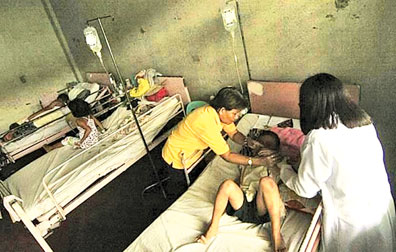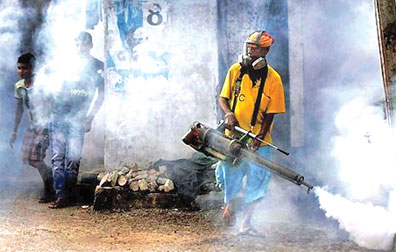9,036 and counting
Dengue is back with a vengeance and Colombo District
is the worst affected:
by Carol Aloysius
 |
| A critical
dengue patient being treated |
 |
| Municipal
workers fogging a dengue site |
The dengue carrying vector is apparently having a busy agenda flying
to every nook and cranny in Sri Lanka infecting thousands of
unsuspecting persons with its deadly bite.
By February 25, latest official statistics from the Epidemiology Unit
(EPU) revealed 8506 suspected cases of dengue in just one month
(January), while the number of cases for January and February amounted
to 9036- more than fifty-five percent reported from the Western
Province(WP).
Who is to blame for this rapid spread of a disease that can kill
victims? Who is responsible when young children affected by its more
severe forms of Dengue Haemorraghic Fever ( DHF) and Dengue Shock
Syndrome ( DSS), die? What is the Health Ministry doing to contain its
spread, besides taking to court and fining ‘dengue breeders,’ who they
say are the main culprits for the spread of dengue?
Director, anti Dengue Campaign, Dr A.R.M Thowfeek said, “We have
already graded and identified the high risk districts according to their
case loads, and will initially start our next Dengue control program in
the district that has the highest number of cases which is the Colombo
District. The campaign will get underway from March 10-12. Thereafter,
we will go to the other districts under the high risk areas such as
Jaffna, Kandy, Galle, Kalutara, Kurunegala, Gampaha and Puttalam”.
The sharp rise in the number of dengue cases has also prompted
Epidemiology chief, Dr Paba Pallihawadana to instruct officers and MOH’s
to step up clearing up activities of all mosquito breeding sites. These
instructions were sent to all regional and provincial heads with regard
to taking care of dengue patients and alerting the 20 sentinel hospitals
to stand by and have been accompanied by her usual request to the public
to clear all mosquito breeding sites.
“This is an endemic disease following heavy rains. So our cleaning up
campaigns are conducted on an on-going basis . We have already conducted
2-3 such campaigns recently with another coming up next month. However,
the public’s co-operation is extremely vital in order to reduce the
mosquito population islandwide.
If schools, householders, state and private offices, and everyone
else participates in these cleaning up campaigns and ensures their
immediate neighbourhoods don’t contain any material that attracts
mosquitoes such as plastic lunch sheets, rigi foam boxes, coconut
shells, discarded yoghurt cups, old tyres, and dead leaves , on an
on-going basis, this problem can be resolved to a great degree”, she
told the Sunday Observer in a hurried telephone interview.
Many irate house owners and other members of the public, however, are
not prepared to take the rap for the dengue spread. Milroy B,(not actual
name) a Colombo resident living at an intersection between Colombo 7 and
Colombo 10, blames the CMC. He complains that the garbage in his house
and that of his neighbours is often not cleared in time. “ When we
informed the CMC we were told they would send a lorry to clear the
garbage thrice a week. But sometimes they don’t come for a week. With
three schools nearby, as well as three hospitals including the National
Hospital, delaying to clear garbage down this lane is a death trap as it
can expose both children and adults alike to this danger.”
Samali, a housewife living in an overcrowded shanty garden also has
an axe to grind with the local Municipality. She told us, “When there
was an outbreak of dengue in one of the houses in our garden recently,
we informed the PHI. But he delayed coming for some reason. As we needed
confirmation as to whether the patient had dengue or not, we delayed
taking him to hospital. He is now critically ill and doctors don’t know
if he will live or die”.
“The delay was taking the patient to hospital if he had fever for
over two days. Even if there is a delay for the PHI to turn up, they
should have taken the patient to hospital in the first place ”, says a
municipal officer on grounds of anonymity. He also denied their Public
Health Inspectors don’t respond to such calls.
“Our Department may be handicapped by a shortage of staff, but we
always make sure that if we are informed of a dengue suspect, we
immediately send out a team to investigate the matter. If a positive
case has been identified, our officers go to the site and spray all the
houses within 100 yards of the house where there has been a dengue case,
to protect the neighbouring residents from being infected. We also give
them advice on how they should clean the inside of their homes and
outside”, Colombo Municipal Council Public Health chief Dr. Ruwan
Wijemuni says.
Commenting on the methods used, Anti Dengue Campaign Director Dr
Thowfeek says, ‘ methods depend on each case. The usual methods are
fogging and spraying (we now do wall spraying mostly in low income
homes)) and larvicide spraying . We also help to clear up debris .
In all our main campaigns we are assisted by the Tri Forces, Police,
and our own PHIs.”
Receptacles attracting mosquitoes
Listing some of the most common receptacles that can attract
mosquitoes and facilitate their laying of eggs, he said, “Dengue is a
small container disease. So avoid throwing used yogurt cups, plastic
plates, cups, rigifoam boxes, in your garden.” Did he have any useful
tips with regard to disposing of these materials.?
“Buy only biodegradable plastics as they remain in the soil for upto
a hundred years. Put everything in a garbage bag and leave it out only
on days the garbage collectors come. Empty coconut shells can be burned
or buried. Blocked drains are another source of attraction for
mosquitoes., So are blocked roof gutters. Clean your roof gutters of all
leaves. If there are overhanging branches from trees, cut them down.
Remember it takes only a drop of rain water which if allowed to stagnate
for a week can breed hundreds of mosquitoes “.
Roof gutters
The Ministry of Health some time ago announced a proposal to ban roof
gutters in all new homes and buildings including hotels. While admitting
that the use of roof gutters was a time honoured custom in every house
for the past many centuries, it is also a fact that overflowing gutters
are also one of the commonest reasons for water entering houses during
heavy rains.
Asked for her comments, Dr Pallihawadana said, “ Gutter-less homes is
not the answer to the dengue menace. Besides, unless these gutters are
cleaned at least once in two weeks. They will continue to attract
mosquitoes”.
As she points out , “The answer lies in the public’s accountability
and willingness to take responsibility for their own premises and keep
them free of mosquito breeding sites. Not only dengue even Zika can be
spread as the same dengue carrying mosquito is also responsible for
spreading Zika.
However, we have no reports of any patients with Zika here as yet,
though we are ready to face any emergency”, she added. Anti Dengue
Campaign sources also said they were discouraging people from using
gutters on roofs.
That said, we wondered whether the Health Ministry could offer new
house builders some tips on how they could still retain their roof
gutters- and at the same time prevent water collections that attract
mosquitoes as well
They may do well by taking heed of what Dr Thowfeek says:
“Make sure the gutters are not flexible and don’t bend easily.
In general, we tell house builders who seek our advice, they should
make only tiny holes or gaps for the water to run out and make sure the
slope is properly maintained. If a gutter is ten inches long, a one inch
angle or gap is more than enough”
Why?
“Because a very small opening for rain water from a gutter to fall
off to the ground, will prevent large amounts of water spilling in pools
below which will attract mosquitoes as they take a long time to dry.
Tiny drops will drip to the ground and if the sun comes up in a few
minutes, it will be easier for these drops to dry out”.
Meanwhile Health Ministry sources have offered the following
guidelines to detect symptoms of dengue and its more severe forms and
the golden rule to follow in patient care at home;
What are the common symptoms of Dengue Fever? Says a Consultant
community physician from the Anti Dengue control Unit::
“If you have at least two of the following symptoms you need to
suspect having Dengue Fever. With high grade fever,
*Headache and pain behind the eyes(retro-orbital pain)
*Generalised muscle pain and joint pain
*Nausea and vomitting
*Red spots on the skin and bleeding tendencies.
If you are living in a highly endemic area it is also an important
factor to consider
When you have fever what should you do?
*Adequate physical rest; don’t send your child to school during the
illness.
*Paracetamol should be given in recommended doses.
*Tepid sponging for fever.
*Avoid all NSAIDS and steroids. (Mefenamic acid, Ibuprofen, Diclofenac)
*Adequate amount of fluid such as rice cunjee, fruit juices, Jeewani,
milk, soup are preferable to water.
*Take usual meals if possible, avoid red, brown, black coloured
foods.
*Consult a qualified doctor If you have fever for more than two days. |

